Back in 2006, when blogging was still coming into its own as a political medium, I started UNSG.org. The site aimed to shed light on the selection of Kofi Annan’s successor as UN Secretary General, generally discussed only by academics and government officials behind closed doors. It was a rewarding experience – I went on to do my master’s thesis on improving global leadership selection – and is a topic I look forward to returning to upon the next selection. That time is almost upon us.
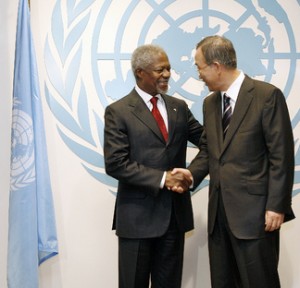
Ban Ki-moon has almost four years remaining in his second term. His successor will be chosen by the General Assembly in October 2016 upon nomination by the Security Council. In this regard, historical precedent will hold sway. That is about all that will. A number of other questions – several of which first emerged in the 2006 selection – will make blogging about this process again very exciting.
The first question that will be asked by anyone remotely familiar with the UNSG selection is which region’s “turn” is it now to hold the post. For those less familiar, UN member states are informally and somewhat clumsily divided into five historically based regional groups – Africa, Asia, Latin America and the Caribbean, Eastern Europe, and Western Europe and Others (WEOG). (Yes, more than two decades after the end of the Cold War, Europe is still divided along East and West, while Asia spans from Cyprus to Samoa.) Traditionally each region has rotated into the post for two five-year terms. Boutros Boutros-Ghali and Kofi Annan held it for the African region from 1995-2006, and Ban Ki-moon has since held it for Asia’s two terms.
So whose turn will it be in 2016? The answer is not entirely obvious as the rotation scheme has been an historically imperfect but important geopolitical matter. Unanimity against the U.S. over renewing Boutros-Ghali’s term in 2000 was overcome when the U.S. agreed to support another African, maintaining the rotation. In 2006, China made it clear that only an Asian would receive its support despite cries for ending the practice. The three remaining regions are the Western Europe, Eastern Europe and Latin America.
Due to the preponderance of WEOG states in the UN membership during its early years, three of the first four Secretaries General were from that region. The last, Kurt Waldheim, served from 1972-1981. Each other region has held the post since, save Eastern Europe. Colin Lynch has suggested the next round would go to WEOG, naming Helen Clark as a likely candidate. (Clark’s second term at UNDP is scheduled to conclude less than six months after the next Secretary General is selected.) The UNElections Campaign speculated that WEOG governments will argue for a renewed rotation, with a Western Secretary General again following an Asian incumbent, and preceding in turn a Latin American and African office-holder. Lynch’s speculation on Michele Bachelet as a future Secretary General suggested this possibility as well.
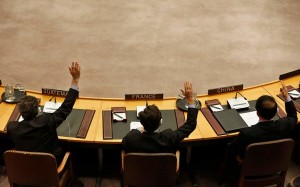
Photo credit: Brendan McDermid/Reuters
This of course again ignores Eastern Europe as a region for the purposes of filling the office. But Richard Gowan, in World Politics Review, isn’t so ready to write them off. He suggests that “there seems to be a general diplomatic consensus that in 2017, Eastern Europe’s turn will come at last.” He does not elaborate on that, but short lists three East Europeans for the post: former Slovene president Danilo Türk, Slovak diplomat Jan Kubiš, and current UNESCO Director General Irina Bokova from Bulgaria. The fight, he says, will come down to two questions: whether Russia will support a candidate from its former sphere of influence, and the impact that geopolitical tensions, such as those surrounding Syria, will have on the selection.
Eastern Europe’s chances of securing the post improve dramatically if the regional members get behind a single viable candidate, and do so early on. But the cost may be excessive. Unlike in previous selections where candidates were selected from middle to weak economic powers, the top two vote-getters in the 2006 selection came from the 11th and 12th largest economies. There is no reason to believe that this shift will reverse itself in 2016. If Western Europe decides to pursue the post, it could easily outspend its Eastern neighbors in outreach (and potential bargaining chips) with other states.
An inter-European competition could result in a number of scenarios. The worse situation for the Europeans would be the emergence of a compromise candidate from Latin America to whom the Asian and African blocs switch their support. A Latin American bid might argue against the viability of East European candidates and against the dominance of Western Europe in the post previously, on the Security Council and in other intergovernmental institutions currently. To avoid this, either the East and West will need to put forward an impeccable candidate, reach a compromise to rotate the two European terms this round and/or support the other’s candidate in another organization.
Other questions will soon arise in discussions on the selection. Should the next Secretary General be a woman, regardless of region? Will candidates publicize their interest as in 2006, and if so, what role could social media play in their campaigns? These and other questions should be explored and will be in future posts.
Watch this space.
——————–
Receive notification of the latest Global Memo posts by email, on Facebook or via Twitter.

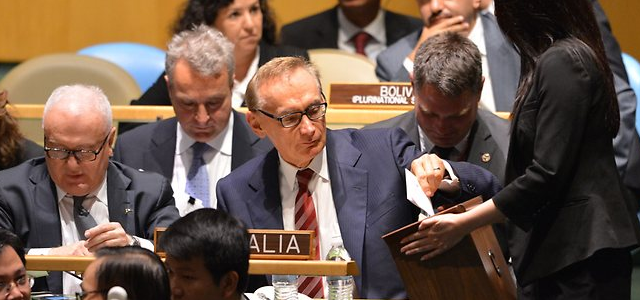

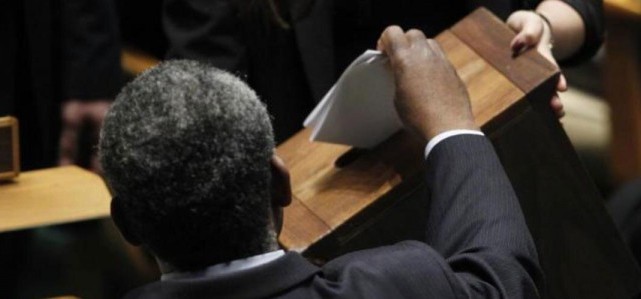

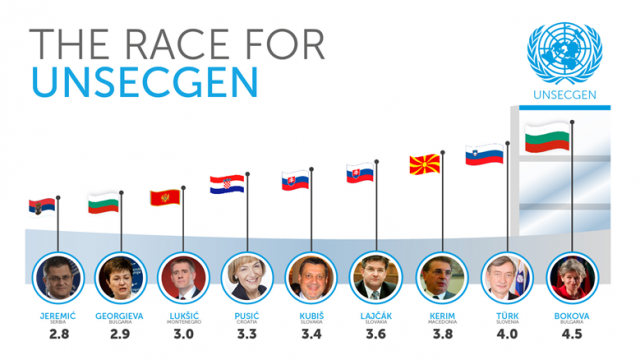
Tony, my comment on the “general diplomatic consensus” in favor of an Eastern European candidate was based on a series of conversations with diplomats and UN officials, who mostly took EE’s claim seriously. However, I admit that this is more anecdotal than authoritative and I note at the end of my piece that WEOG candidates could come forward too. Clark is definitely one name I’ve heard, but not the only one.
Equally, I’ve heard quite a few additional names of potential EE candidates since publishing my article on this, and there are some serious figures involved (although most of this is speculation). I suspect that we’ll have to wait until after the EU divvies up big jobs in Brussels next year before we get a real picture of both EE and WEOG options.
Clark is obviously a strong contender, but she may face a sense among EU leaders that they really should choose one of their own to maximize their leverage at the UN…
It could be an interesting (and complicated) race!
Thank you, Richard, for these additional thoughts on the race. Before reading your article and looking over a few other sources, I would have believed Latin American would swoop in for another term, overlooking EE once again. There are a number of potential moving pieces, and it will be fascinating to watch once the jockeying begins.
Let’s stay in touch and share what scuttlebutt we each hear.
Who are the leading candidates from the Latin America & Caribbean block?
Great post, Tony.
ban ki mon is useless, he did nothing, he couldnt stop any warn, neither work for peace, somuch of violence every where, egypt, syria, pak, afgan srilanka, sudan, but america chose moon instead of tharoor. coffee annan was good enough working fo peace.
Good piece. Important to start debate and discussion on what kind of Secretary-General we need. Geographically, Eastern Europe stands in turn, while the South is underrepresented. An anglosaxican westerner is not reflective of the UN aspirations at this juncture. Character wise, there is a need for an impeccible record of service and honest character, rather than one of political ambition and political shrewdness.
i hope they give it to a man so that when its Africa’s turn i can stand a good chance great article tho.
What about Kevin Rudd (ex-Australian PM)? We have heard that he is courting this position?